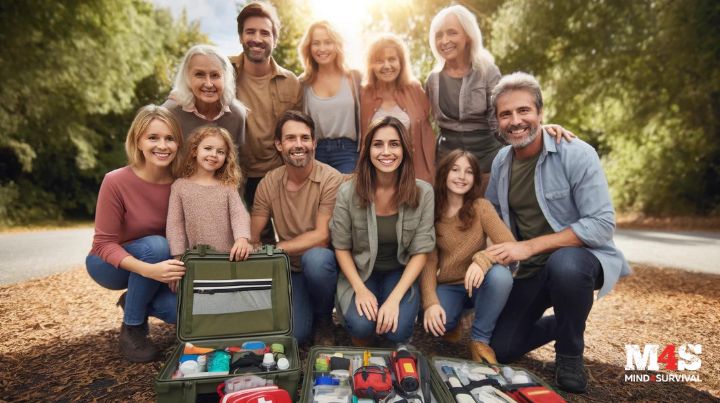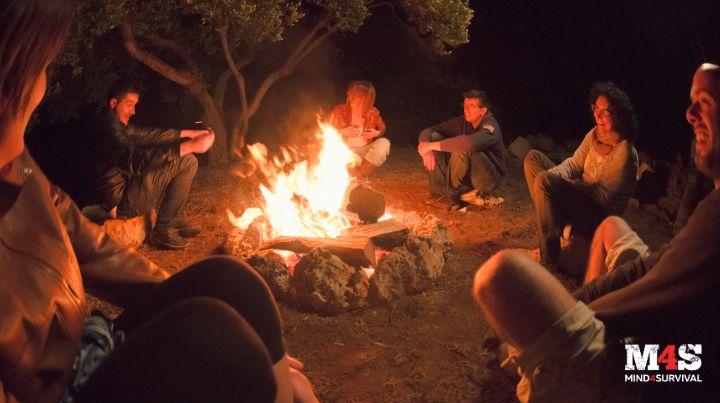Preparedness goes beyond stockpiling supplies and mastering survival skills. It’s about building a network of supportive, like-minded individuals. While facing challenges alone might seem appealing, survival in isolation is rarely sustainable. Thriving during challenging times depends significantly on the strength of your community. This article is going to discuss the importance of community in preparedness and survival.
The Lone Wolf Myth
Many romanticize the notion of the lone survivor, but history shows we thrive in communities. Our ancestors built villages and towns for convenience and out of necessity for the support a community offers. Each person contributed a vital skill, whether as a blacksmith, a farmer, or a healer, ensuring the group’s survival and prosperity.
Trying to go it alone during difficult times means juggling numerous roles—gardener, cook, medic, and more. This is overwhelming and impractical. After all, who will be there to help with what you cannot do if you’re ill? A well-prepared individual recognizes the need for a community where skills, resources, and moral support are shared.
Building a Support Network
Creating a robust community involves connecting with people who share similar values and goals. Your network becomes invaluable during emergencies, whether natural disasters, societal disruptions, or personal crises. Having a group to rely on provides security and resilience.
When people think of community, they tend to think of their neighborhood, town, city, etc. However, your community is whatever you define it as. Your community doesn’t need to be confined to immediate neighbors. It can include friends and family living farther away, ready to provide a roof over your head if you need to evacuate your home. The essence of community is mutual support, extending beyond geographical boundaries.
Stepping Out of Your Comfort Zone
For those who prefer solitude, the idea of building a community might seem challenging and the opposite of what you feel comfortable with. However, it’s crucial to open up and engage with others. Isolation can lead to narrow-mindedness, lacking essential human interaction, and impossible struggles requiring team effort. Building relationships enhances learning and personal growth, making you more adaptable to crises.
The Role of Neighbors
Getting to know your neighbors is a fundamental step in community building. Introductions can reveal potential allies or identify individuals to be cautious of. Early interactions help establish trust and awareness, which are critical in high-stress scenarios. Knowing who you can rely on—or who might pose a threat—allows for better preparedness planning.
Practical Steps to Build Your Community
- Introduce Yourself: Take the initiative to meet your neighbors. Simple gestures like sharing garden produce or inviting them for a chat can break the ice.
- Join Local Groups: Participate in community activities or local preparedness groups. These gatherings are excellent for sharing knowledge and resources.
- Online Communities: Leverage social media and online forums to connect with like-minded individuals. These platforms can offer support, advice, and information exchange.
- Skill Sharing: Organize skill-sharing sessions where community members teach each other vital survival skills, such as first aid, gardening, or home repair.
- Emergency Plans: Develop collective emergency plans with your community. Identify safe meeting points, share contact information, and establish communication strategies.
Benefits of a Strong Community
A well-knit community offers numerous benefits:
- Resource Sharing: Access to shared tools, food supplies, and knowledge.
- Emotional Support: Reducing stress and anxiety through mutual encouragement and reassurance.
- Increased Safety: Greater vigilance and assistance during emergencies.
- Skill Diversity: A pool of varied skills enhances overall survival capabilities.
Community Building for Beginners
For those new to preparedness, the thought of building a community might feel overwhelming. Start small and gradually expand your network. Here are some tips to get started:
- Attend Local Events: Look for events related to preparedness, gardening, or other interests. These are great opportunities to meet like-minded individuals.
- Volunteer: Get involved in community service. Volunteering helps others and allows you to connect with people who value community support.
- Start a Club: If there isn’t a local preparedness group, consider starting one. Even a small group of dedicated individuals can make a significant difference.
- Communicate Openly: Share your interests and goals with friends and family. You might be surprised to find others who are also interested in preparedness.
- Be Consistent: Regular interaction is vital. Stay in touch with your community members and participate in activities consistently.
The Importance of Diverse Skills
A community thrives on the diverse skills of its members. Each person brings something unique to the table, enhancing the group’s ability to survive and thrive. Here are some skills that are particularly valuable in a preparedness community:
- Medical Skills: Basic first aid, CPR, and knowledge of natural remedies can be lifesaving.
- Gardening and Farming: Growing food and raising animals provide a sustainable food source.
- Mechanical Skills: The ability to repair tools, vehicles, and infrastructure is crucial.
- Cooking and Food Preservation: Knowing how to cook with basic ingredients and preserve food ensures long-term sustenance.
- Security: Basic self-defense and home security knowledge can protect the community.
Building Trust and Cooperation
Trust is the cornerstone of any successful community. Here are some ways to build and maintain trust:
- Be Reliable: Follow through on your commitments. Reliability builds confidence and trust.
- Communicate Clearly: Open and honest communication prevents misunderstandings.
- Show Respect: Treat community members respectfully, even those with different opinions.
- Share Responsibilities: Distribute tasks and responsibilities fairly. This fosters a sense of ownership and accountability.
Overcoming Challenges
Building a community isn’t without its challenges. Differences in opinions, lifestyles, and preparedness levels can create friction. Here are some strategies to overcome these challenges:
- Set Clear Goals: Define the community’s objectives and ensure everyone is on the same page.
- Embrace Diverse Perspectives: Recognize that different perspectives can strengthen the community.
- Practice Patience: Building a cohesive community takes time. Be patient and persistent.
- Resolve Conflicts: Address conflicts promptly and fairly. Encourage open dialogue to find mutually acceptable solutions.
The Bottom Line on Establishing Your Community
The importance of community in preparedness and survival cannot be overstated. While individual skills and supplies are essential, the support network provided by a community is invaluable. Building and maintaining these relationships not only enhances your chances of thriving during difficult times but also enriches your everyday life. Embrace the power of community, step out of your comfort zone, and foster connections that will help you flourish in any situation.
By focusing on community, we not only prepare for emergencies but also create a network of support that enriches our lives. Start building your community today and experience the strength and resilience that comes from working together.
What are your thoughts on establishing a community? Please share them in the comments below.
Stay safe,
Read the full article here



